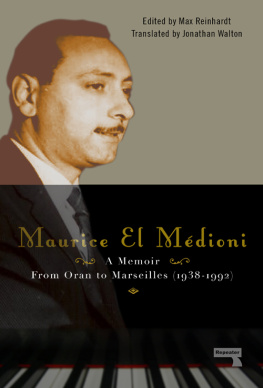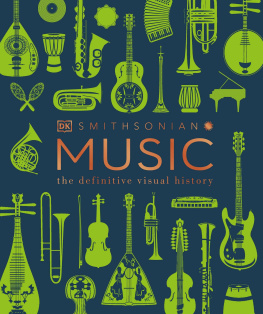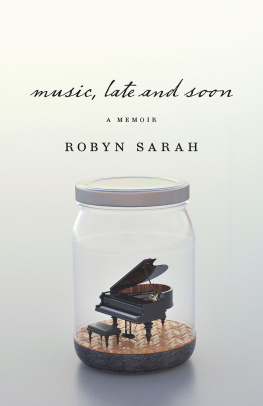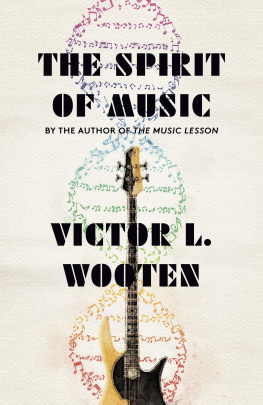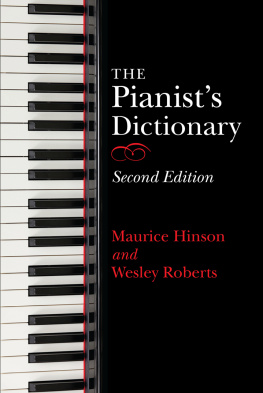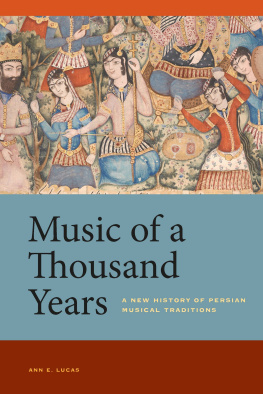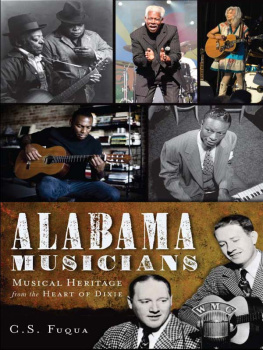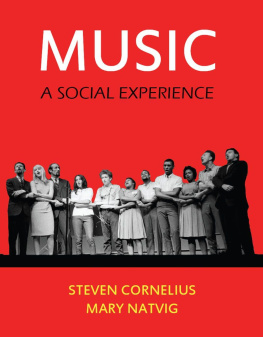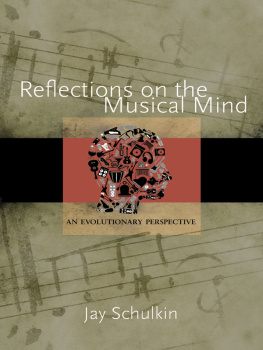Maurice El Mdioni: A Memoir
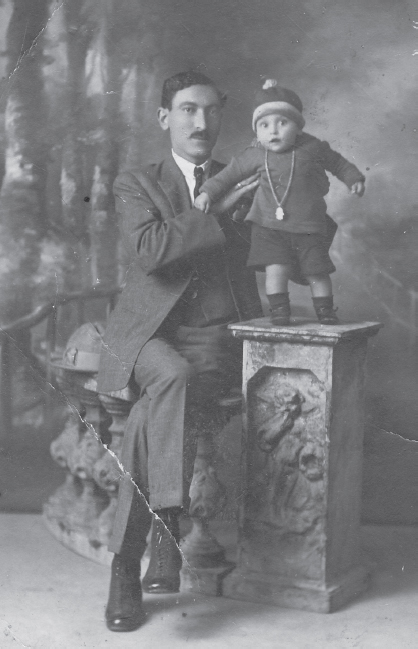
Maurice approx. 18 months old with his uncle Saoud LOranais, Oran, 1929
Maurice El Mdioni: A Memoir
From Oran to Marseille
(19351990)
By Maurice El Mdioni
Edited by Max Reinhardt
Translated & Curated by Jonathan Walton

how hard it must be to live only with what one knows and what one remembers, cut off from what one hopes for!
Albert Camus, The Plague
You were there at my birth. I spent my childhood in the derb
Oran, Oran, Ill never forget you, I think of you
Oran, Oran, we will revere you and always love you
Maurice El Mdioni, Oran, Oran
(Descarga Oriental/Piranha Records)
Contents
To Maurice El Mdioni /
A Personal Preface from a Fan
So: here we have the autobiography of a man whose piano holds many stories, many life stories. The poignant piano, awash with binaries: Western tuning <> Oriental maqamat; boogie-woogie <> bdoui and chaabi; full fat chords <> elaborate single lines; caf cabaret <> sacred, sainted; a life in Algeria <> a life in France; even, OK, Jewish <> Muslim. And as his album Caf Oran proclaims: A piano is a house with eighty-eight keys. Roll em Maurice!
Roll em Maurice, indeed. I was fortunate enough to be the designated producer on the Caf Oran recording sessions [Berlin, 1994, big radio studio, illustrious and simpatico guests]. Maurice in his sparky sixties, me in my weedy forties, feeling like a baby when faced with Maurices musical and personal history, his bonhomie, love of jokes and tales and unique Mauricien piano attitude. Actually, I had been introduced to him somewhat earlier by Dr Francis Falceto [of later Ethiopiques fame], who played me a Maurice-produced cassette of his pianoriental stylings Ben! listen to this! and later took us [me and Christoph Borkowsky of Piranha Records] to a giant Parisian warehouse party to mark the return of the great singer Lili Boniche, with whom Maurice was playing as accompanist.
I think that we worked each other out in the studio. Maurice is still convinced that I am the best sound engineer with whom I have ever worked, which is awfully nice of him to say, as I am absolutely not a sound engineer, merely a producer. Producers such as I cant survive without brilliant sound engineers. I hope that I put all of the musicians at ease, anyway. I gave Maurice a CD of Lionel Hampton [a nod to his boogiewoogie beginnings in Oran], and Maurice The Treasure opened up his shy English very 1940s American. An excellent start.
Over the years I have seen Maurices stylings open the ears and hands of young piano players, helping them to grasp that there are many ways to enter the eighty-eight-key music house: long, decorated, modal lines in double octaves; the Mediterranean touch and Mediterranean worldvoice; the open, modular solo passages that start when they start, end when they end, and are governed by the El Mdioni logic. The El Mdioni way is wonderful.
I remember walking around Paris with Maurice, in the IXe arrondissement, the old seat of the rag-trade, and of Jewish restaurants [we ate at the classic Les Ailes] and of cabarets feeding the memories and spirit of the transplanted Jewish North African community. Oh yes here was such-and-such club, where we used to play and here was and here we; and again, walking around Orans mirror-port Marseille with him, talking about the rafle of 1943 which snatched his recording artist uncle Messaoud El Mdioni, Saoud lOranais, and took him to the concentration camp and that was it. The feet follow the older footsteps and memory joins them.
This autobiography is full of stories that Maurice will tell you. I do have one to add a fantasy of a meeting that, perhaps, didnt happen. Young boogie-woogie Maurice, running around the Americans arriving in newly-liberated wartime Oran, bumping into American troubadour-of-conscience Woody Guthrie, then serving in the Merchant Marines, newly landed in Oran, and wandering around the Casbah. Yes, Maurice was there. Yes, Woody was there. Lets enjoy that meeting, and imagine that they influenced each other. I must ask Maurice about that.
Roll em Maurice!
Ben Mandelson, London, 2016
An Introduction to Maurice El Mdioni
All I maintain is that on this earth there are pestilences and there are victims, and its up to us, so far as possible, not to join forces with the pestilences.
Albert Camus, The Plague
You hold in your hand a memoir that could have been lost to history in the closing years of the last century. Maurices account of his life was handwritten, as you will see, and it recalls a time in North Africa that has long since disappeared. Its a story of family, of personal and commercial struggles, of wars and exile, of colonialism and racism, of Jews and of Arabs, of tailoring and weddings. Its a story told by a member of one of the oldest tribes of all, Musician.
Maurice is a compulsive and innately hip musician, always searching for Other music and musical styles, always reaching out beyond the prejudices and the musical limits of his Orani Jewish community, of whom he remains a keen, proud, upstanding and enthusiastic member. Consequently, he was part of a group of Muslim and Jewish musicians who quite naturally in the 1940s and 50s forged a new music together in North Africa at a time when that wasnt at all strange, it was totally commonplace. That was the just the way the music and the people rolled.
But above all, this is a story told by a musician who thought his music had died when he wrote this memoir. Happily, for all of us who have fallen in love with his music over the last three decades, as it turned out, he was quite wrong.
The clich is that great music outlives the musicians who create it. And there is an undeniable truth somewhere in there; after all, music in its many forms and formats can be preserved and passed on free of the limitations of mortality. But octogenarian greats such as bluesmen Son House and John Lee Hooker or Cubas Buena Vista Social Club outlive the initial popularity of the musical genre within which they originally flourished. And then, decades later, it is their careers that make the music live on and catch fire to new generations, new audiences and new markets across the globe, as musical currents and tides, such as the UK Blues boom of the 60s or the ongoing World Music phenomenon, work their unpredictable magic.
Maurice El Mdioni, Algerian-Jewish master of pianoriental, will turn eighty-nine this year and his unique and innovative piano style, his indomitable spirit and the turbulent panorama of his long career in Algerian chaabi and rai music has followed a similar trajectory. The music should have stopped, or at least petered out, several times for personal, political and historic reasons. But instead he has become a revered and iconic figure in World Music. In fact its difficult to imagine a time when his sound wasnt one of its primary colours, though in fact even twenty-five years ago he was largely a forgotten and unknown figure.
It was those World Music pioneers, the Berlin-based Piranha Records label, that first brought him to the attention of wider audiences with their release in 1996 of Caf Oran. It was an ingenious way of taking an unknown musical treasure and opening a whole new chapter for him and his music. The album delivered a triple impact: the extraordinary unique sound of his playing boogie-woogie/Latino stylings of his left hand underpinning the
Next page
